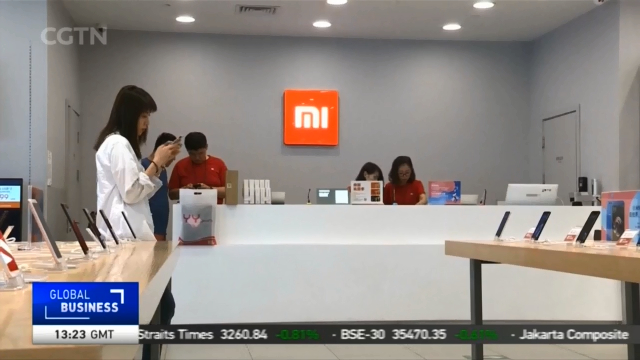
21:58, 25-Jun-2018
Xiaomi HK IPO: First dual share structure company embarks on HKEX
03:07

Hong Kong is abuzz with investors trying to get in on the city's biggest IPO in years. Xiaomi is opening its retail book today. The firm will start trading on July 9th, as the first tech float on the Hang Seng under new rules that allow dual-class shares. --Diane To takes a look at whether the smartphone maker is living up to its hype.
Xiaomi's $6.1 billion Hong Kong listing will be the biggest in the world this year. But it's well short of the $10 billion IPO that many had earlier anticipated. Investors have voiced doubts about the smartphone maker's potential to grow its profit margin, given its market share is largely on the lower end. At its weekend news conference, CEO Lei Jun swept the uncertainties aside, calling his company a "new species".
LEI JUN. CO-FOUNDER & CEO BEIJING XIAOMI TECHNOLOGY CO. "Xiaomi is a rare tech company that handles hardware, e-commerce and internet services. People should not underestimate its competitiveness in the market."
The company posted an unprecedented 100-plus billion yuan in annual revenue, Lei pointed out, in just seven years' time. Some analysts agree the firm's unique model has a bright future, especially given the increasing spending power on the Chinese mainland.
GAVIN PARRY, MANAGING DIRECTOR PARRY INTERNATIONAL "It's positioned very much for multiple sale side of things, so the generic, the low cost end of market - which very much for China fits perfectly as you've got a burgeoning middle class that really has aspirational requirements to fulfill, and Xiaomi is very, very much positioned to fill that."
Xiaomi is offering nearly 2.2 billion shares at HK$17 to HK$22 each. That puts the company's value at between (US) $55 and $70 billion. And it will be the first dual-class listing on the Hang Seng under new exchange rules designed to draw tech floats. Class A shares will enjoy 10 times the voting weight of Class B shares. It's a structure that Xiaomi's Senior Vice President and CFO Chew Shouzi promised will benefit shareholders in the long run, saying it would allow management to "create value for shareholders, users and employees with a long-term vision".
DIANE TO HONG KONG "Its smaller-than-expected IPO was in large part because Xiaomi scrapped plans to sell shares on the Chinese mainland at the same time through the country's new depository receipts scheme, known as CDRs. The company confirmed on Saturday that it has "no time frame" for reviving the CDR sale, while insisting it has no dispute with Chinese financial regulators. Now the smartphone maker's move has raised the question: Is Beijing failing in its efforts to lure foreign-listed Chinese tech firms back home?"
GAVIN PARRY, MANAGING DIRECTOR PARRY INTERNATIONAL "A lot of reason CDR is going to come about and will come about purely because there needs to be some kind of international board in Shanghai. We do have a US denominated B-share market but that's not open enough yet."
Xiaomi's executives called the Chinese share plan a "major innovation". But their commitment to it is unclear, saying only that they'll pick an "appropriate time" to issue CDRs later on. Diane To, CGTN, Hong Kong.

SITEMAP
Copyright © 2018 CGTN. Beijing ICP prepared NO.16065310-3
Copyright © 2018 CGTN. Beijing ICP prepared NO.16065310-3